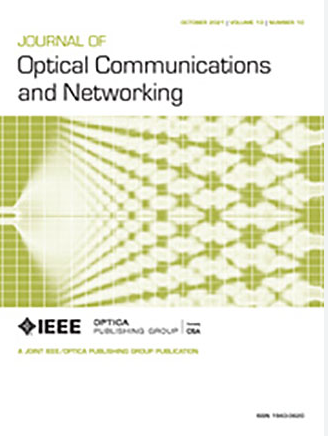Probabilistic path computation and frequency assignment to mitigate spectral fragmentation in elastic optical networks
IF 4
2区 计算机科学
Q1 COMPUTER SCIENCE, HARDWARE & ARCHITECTURE
引用次数: 0
Abstract
Management of spectrum fragmentation in optical transport networks typically requires after the fact defragmentation. This paper proposes a probabilistic approach that mitigates the creation of fragmentation by reducing spectral waste and increasing the expected number of allowable additional lightpaths. The proposed approach is simulated and compared against both first fit as well as fragmentation aware spectrum assignment methods, and the comparison results are provided.通过概率路径计算和频率分配缓解弹性光网络中的频谱碎片问题
光传输网络中的频谱碎片管理通常需要进行事后碎片整理。本文提出了一种概率方法,通过减少频谱浪费和增加可允许的额外光路的预期数量来缓解碎片的产生。本文对所提出的方法进行了仿真,并将其与首次拟合以及碎片感知频谱分配方法进行了比较,同时提供了比较结果。
本文章由计算机程序翻译,如有差异,请以英文原文为准。
求助全文
约1分钟内获得全文
求助全文
来源期刊
CiteScore
9.40
自引率
16.00%
发文量
104
审稿时长
4 months
期刊介绍:
The scope of the Journal includes advances in the state-of-the-art of optical networking science, technology, and engineering. Both theoretical contributions (including new techniques, concepts, analyses, and economic studies) and practical contributions (including optical networking experiments, prototypes, and new applications) are encouraged. Subareas of interest include the architecture and design of optical networks, optical network survivability and security, software-defined optical networking, elastic optical networks, data and control plane advances, network management related innovation, and optical access networks. Enabling technologies and their applications are suitable topics only if the results are shown to directly impact optical networking beyond simple point-to-point networks.

 求助内容:
求助内容: 应助结果提醒方式:
应助结果提醒方式:


